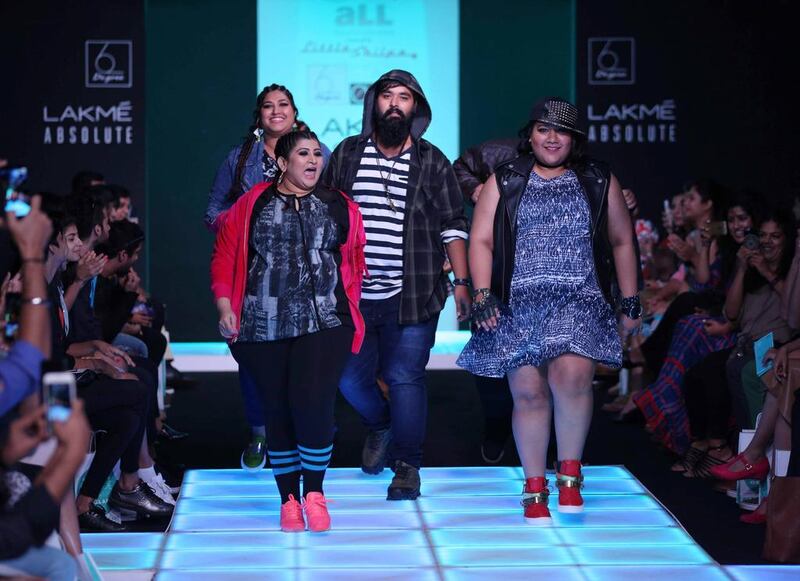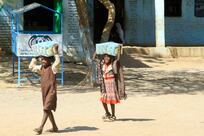Indian designers should move away from almost exclusively using skinny models to avoid body-shaming of larger women, some members of the Indian fashion industry are arguing.
In an effort to create more dialogue about the issue, a plus-size fashion show was staged at Lakmé Fashion Week for the first time on Sunday, August 28, the closing day of one of India’s top fashion events, held in Mumbai.
The show, styled by designer Shilpa Chavan of the Little Shilpa label in association with aLL: The Plus Size Store, saw plus-sized models, both women and men, confidently strutting down the catwalk wearing fitted casual clothing, designed to show off, rather than hide, their bodies.
“When Lakmé approached me to do the show, I didn’t think for a second,” said Chavan. “I said ‘yes’ at the beginning because it was a new thing to do, I think it’s a very empowering movement, and also it was challenging – for India, for us, for Lakmé as well.”
Indian model, designer and television personality Diandra Soares, who attended the show, believes that it raised an important point that needed to be addressed by the industry.
“It’s something I believe in,” said Soares. “I’ve been talking about not body shaming and all of these kinds of things, being part of the industry for over 20 years, and having body image issues like any other women or men out there. I wanted to come and cheer the models on. It’s great that people are taking this initiative to make clothes for large people. I have friends who find it very difficult to go out and shop for clothes; they are constantly complaining and worrying.”
The vast majority of the models featured in shows at Lakmé Fashion Week and other major fashion events in India are tall and ultra-thin, which does not reflect the body shape of most Indians.
“It’s been long that the fashion industry has been dominated by size zero, but that’s not the reality of the general population,” said Manish Aziz, the business head of aLL. “Look at India — it is a ‘voluptuous’ country. It’s high time that the entire fashion fraternity should support this initiative. It’s about removing preconceived notions of beauty to a particular size.”
Amber Kureshi, 33, an Indian who was born in Abu Dhabi, and now lives in Mumbai, was one of the models in the plus size show. She is not a professional model but had been a model manager for years.
“I have dealt with size-zero women, so that gave me a lot of complexes,” she said. “We’re women that do have confidence but we didn’t have a channel or an outlet to say that to the world. What we’ve achieved today is a shift from skinny women or men to curvy and real people – like us. I think India has just caught on.”
Kureshi says she wants to do more modelling and even venture into acting.
“Fat women are offered roles that are funny, something you can laugh at, and I refuse to do that,” she said. “But because of the show, there are people approaching me, asking if I would like to do something in a movie, and we’re being looked at differently. I have even exchanged contact details with casting directors.”
Kureshi said she hopes that future fashion weeks in India wouldn’t need to showcase a dedicated plus-size event, instead integrating women of difference sizes into mainstream runway shows.
It is not only overweight women who feel that they are often excluded from the fashion world.
Arpit Handa, 28, from Mumbai, one of the male models in the plus-size show, says during his time in college, “when I was not a plus-size fellow”, he was doing some modelling and had the beginnings of a promising career. But this fizzled out as he put on weight. He is hoping that his new stint on the runway will be able to revive his career.
“Hopefully we’re going to be taken a lot more seriously now,” said Handa.
Chavan believes that change is on the horizon, now that “social media also pushing for individualistic acceptance and confidence in being body positive. Fashion cannot be a ‘one size fits all’ entity’”.
artslife@thenational.ae





